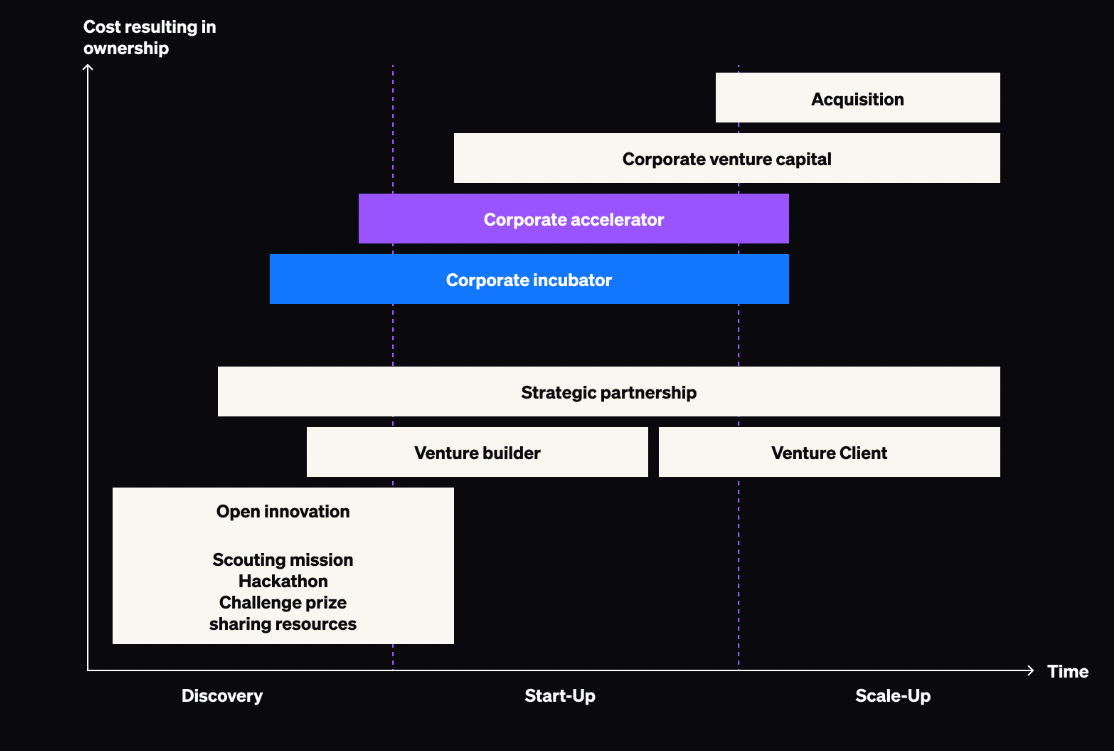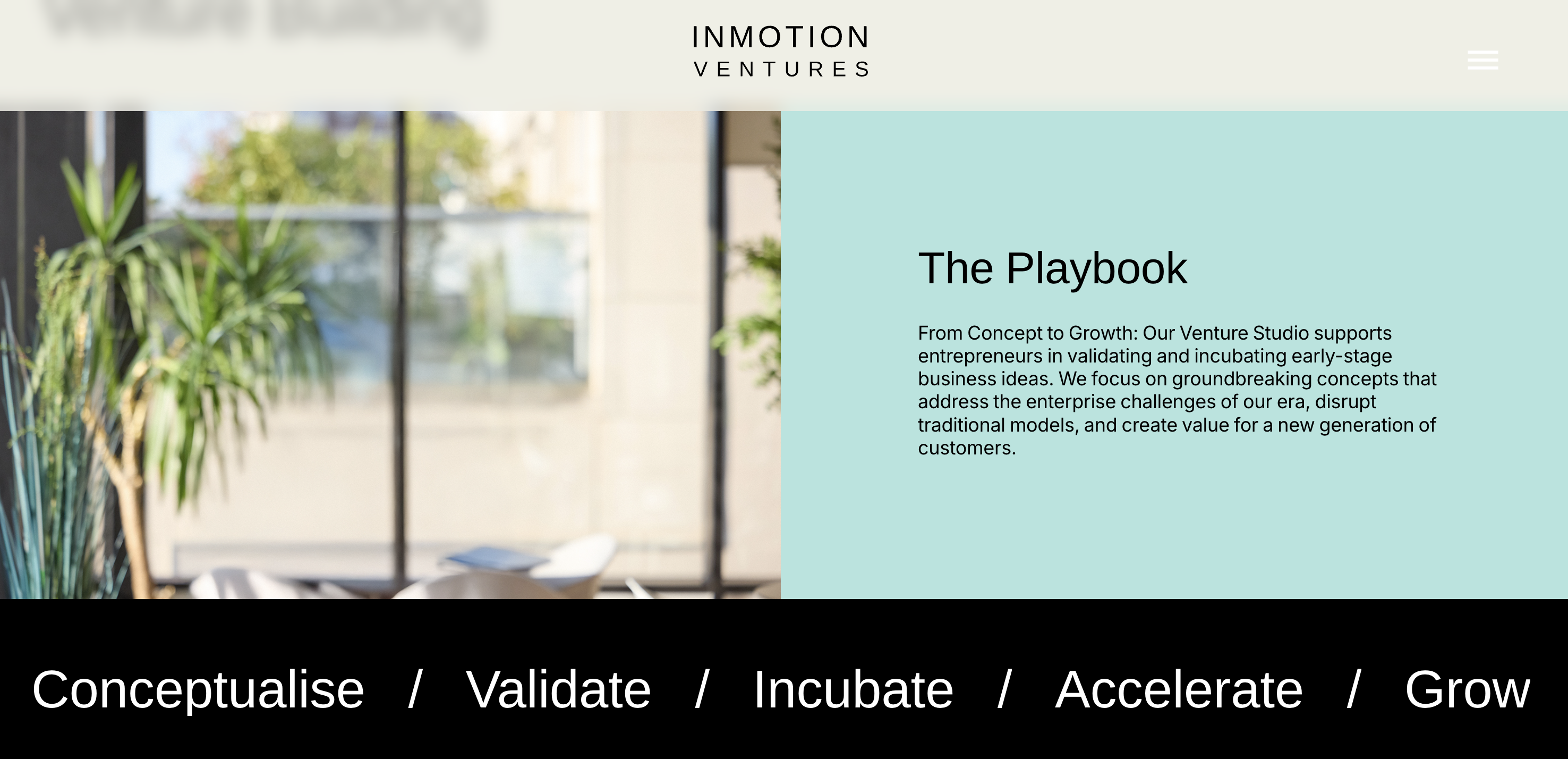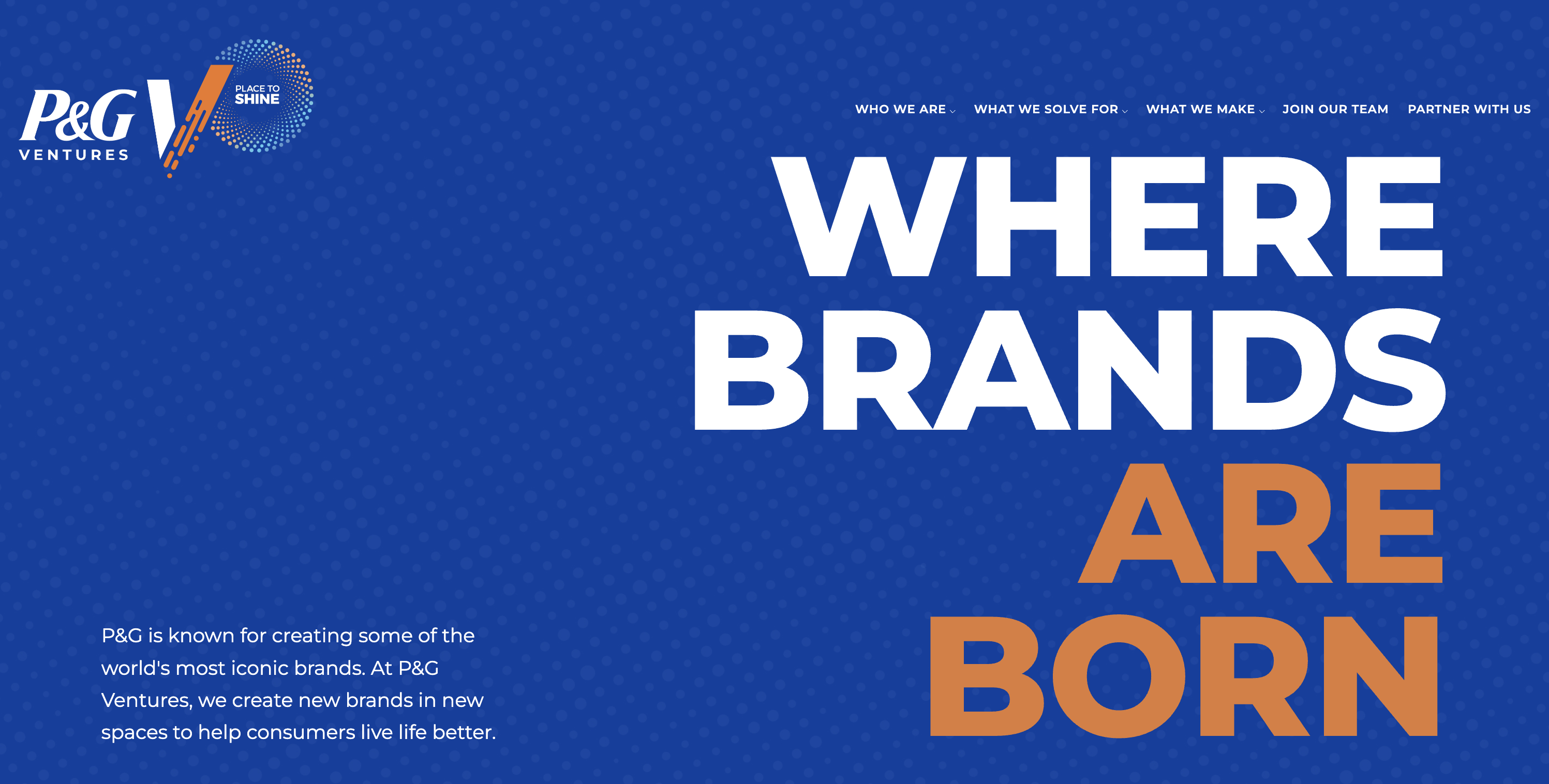Key takeaways
- Venture studios achieve 30% higher success rates than traditional startups by combining experienced entrepreneurial teams, optimised resources, and factory-like efficiency to launch and scale ventures rapidly.
- The venture studio model significantly accelerates funding success, with 84% of studio startups securing seed funding and 72% reaching Series A.
- Time-to-market is drastically reduced, with venture studio startups reaching Series A in 25.2 months, compared to 56 months for traditional ventures.
- The business model yields superior returns, with an average internal rate of return of 53% for venture studio startups, compared to 21.3% for traditional startups.
- Corporations can leverage the venture studio approach to develop successful innovations that extend beyond their core business.
Venture studios have been making big waves lately, touted as a “new model for entrepreneurship” with recent features in the Harvard Business Review, Forbes and Stanford Business (just to name a few). But is all the buzz warranted?
Many would argue that the venture studio model is disrupting the traditional way of building and investing in ventures. By bringing in all-star entrepreneurial teams to ideate, incubate, launch and scale startups, they’re achieving higher success rates than other entrepreneurial models, including incubators and accelerators. Industry players are catching on fast, with investors like Bezos Expeditions, Foundry Group and Emergence Capital, as well as corporations like P&G, Nike and Amazon investing in and applying the model to accelerate growth and boost profits.
Sound intriguing? We’re about to give you a peak behind the curtain, diving into exactly what a venture studio is, how it works and most importantly, why they have higher success rates than traditional incubators and accelerators.
What is a venture studio and does it work?
Venture studios, aka startup factories or venture builders, specialise in building ventures from scratch. Unlike traditional incubators or accelerators, they take a more hands-on approach to venture building, with blended, multidisciplinary teams of experienced entrepreneurs, designers, content creators, marketers and growth marketers working together to ideate cutting-edge business ideas and turn them into profitable businesses.
One of the key benefits of working with a venture studio is that they provide a wider range of services beyond the typical funding and mentorship provided at incubators and accelerators. They’re often involved in every phase of the venture, from concept development to scale, taking on different tasks, including product development, validation, marketing, fundraising, talent acquisition, and more. The approach provides ventures with the crucial support needed to get off the ground and thrive, not just during the beginning stages but in the long term.
Why do venture studio startups have higher success rates?
Venture studio teams launch multiple ventures a year in parallel tracks, taking the lead in everything from concept ideation to product development to marketing all the way to the scale phase. The approach is highly cost-efficient, optimising available services, talent and resources by sharing them across multiple ventures. Here’s an eagle-eye view of the process:
- Validation is key to every stage of the venture development process from idea to scale.
- Data-led decisions are made on which concepts to build, pivot, or kill.
- Concepts with high market potential are carefully nurtured through the MVP phase.
- Successful MVPs are spun out as independent ventures or turned into corporate spin-ins.
In many cases, both the venture studios and the founders they recruit share equity in the ventures they build, giving them a meaningful stake in their success or failure. This rewards model has proven successful across startup ecosystems and VCs alike, attracting high-quality entrepreneurial talent with proven track records for success.
How do venture studios make money?
The venture studio business model is built on multiple revenue streams:
Equity stake
Venture studios typically retain a significant equity stake (30-80%) in exchange for building startups from scratch, providing initial capital, resources, and full operational support. This is notably higher than traditional VC stakes because of their hands-on company-building role.
Exit returns
When portfolio companies achieve successful exits through acquisitions or IPOs, studios realise returns from both their equity stake and their carried interest (typically 20-30% of profits), similar to traditional VC models.
Management fees
Studios charge their investors/limited partners management fees (typically 2-3% of committed capital annually) to cover operational costs and maintain their teams.
Portfolio services
This involves providing shared services to portfolio companies, including:
- Legal and accounting support
- HR and recruitment
- Marketing and design
- Technical infrastructure
This model both creates additional revenue and helps portfolio companies access high-quality services efficiently.
External services
Some studios offer their venture-building expertise to non-portfolio companies and corporations, creating additional revenue streams while deepening their market insights.
This diversified model, combined with their hands-on approach, contributes to their higher success rates compared to traditional startup models.
How do venture studios compare to incubators and accelerators?

Venture studios, incubators, and accelerators all support startup growth, but they differ significantly in their approaches:
Venture Studios:
- What they do: Build companies from scratch using internal teams of experienced entrepreneurs, designers, marketers, and operators.
- Equity and investment: Take substantial equity stakes (30-80%) and make larger initial investments ($500K-$2M+).
- Involvement: Provide full operational teams and comprehensive resources, with deep day-to-day involvement from ideation through scale
- Services: Offer complete support, including product development, validation, marketing, fundraising, and talent acquisition
- Founder model: Develop business concepts internally, then recruit proven entrepreneurs to lead pre-validated opportunities
Incubators:
- What they do: Work with existing early-stage startups, providing workspace and basic resources.
- Equity and investment: Take minimal equity (5-10%), with limited direct funding.
- Time frame: Programs typically last 6-12 months
- Services: Focus on mentorship and guidance
- Involvement: Limited to advisory role, helping founders develop their ideas
Accelerators:
- What they do: Run structured, time-bound programs (3-6 months) for existing seed-stage startups.
- Equity and investment: Take moderate equity (5-15%) and provide small seed investments ($50K-$150K).
- Selection: Choose from external applicants with existing ideas.
- Services: Provide seed funding and mentorship.
- Focus: Emphasis on rapid growth and development.
Which Model is Right for Your Startup?
The key differentiator is that venture studios are true company builders who create and operate ventures themselves, while incubators provide nurturing environments for early-stage startups, and accelerators offer intensive, short-term growth programs.
Do venture studios actually have higher success rates?
Venture studios have gained popularity in recent years as a new approach to entrepreneurship, but are their success rates higher? Well, let’s take a look at some of the numbers. According to a 2022 report by Global Startup Studio Network (GSSN):
- Venture Studio startups have a 30% higher success rate than traditional startups.
- 84% of startups coming out of studios go on to raise a seed round.
- 72% of those ventures make it to series A (compared to 42% of traditional ventures).
- Time from zero to series A is 25,2 months for venture studio startups compared to 56 months for traditional startups.
- The average internal rate of return (IRR) for startup ventures is 53% compared to 21,3% for traditional startups.
The proof is in the pudding with examples of successful venture studio startups, including names like Dollar Shave Club, Snowflake, Aircall, Moderna and more.
What are the benefits of the venture studio model for corporations?
These are just a few reasons:
Optimised resources
Startup studios use shared resources, networks and infrastructure across multiple ventures, reducing costs and getting the most out of each resource. They use a validated approach to identify only a few high-potential ventures per year and then put 100% of their focus into bringing them to life. Essentially, they use factory-like efficiency to build companies and scale their growth at light speed.
The best entrepreneurial talent
Startup studio teams are made up of experienced entrepreneurs, growth hackers and experts with a proven track record of successful business ventures. They work under equity reward models, which gives them skin in the game, resulting in higher long-term success rates.
Reduced risk
Startup studios are equipped with established processes, experienced team members, and a thorough validation approach that enables them to identify potential challenges and address them proactively before they escalate into major issues. This allows startup studios to operate more efficiently and confidently, reducing the likelihood of setbacks and increasing their chances of success.
Proven business model
Venture studios excel at identifying promising concept ideas and launching them quickly using lean validation techniques. The approach enables them to test and validate ideas without wasting time and resources on concepts that may not succeed. As a result, they have high long-term success rates that can be replicated across ventures.
Want to know what NOT to do when building or scaling your venture studio? Check out our report: 5 Failed Venture Studios.
Can corporations use the venture studio model with limited investment resources?
This question was explored in depth during a recent Bundl Venture Club roundtable on venture studios. Here are three key takeaways shared by our innovation leaders:
Use milestone-based funding
Structure investments in stages based on evidence and validation, rather than committing large sums upfront. This reduces risk and focuses resources on what works.
Consider syndicate investment
Partner with other strategic investors to co-fund early-stage ventures. This spreads financial risk and brings in additional expertise and networks.
Broaden your strategic lens
Look beyond internal capabilities. Tap into existing commercial assets like channel partnerships, customer relationships, or licensing agreements to support new ventures at minimal cost.
🚨 These insights are from the Bundl Venture Club. For the full discussion, check out the Venture Studio Roundtable Summary
2 examples of successful corporate venture studios
Here are two great examples of successful corporate venture studios:
InMotion Ventures
Parent: Jaguar Land Rover
Founded: 2016

InMotion Ventures demonstrates how an automotive giant can use the venture studio model to shape the future of mobility. As JLR's venture studio arm, InMotion:
- Creates, builds, and scales ventures in mobility, sustainability, and digital technology
- Focuses on innovations that could transform the mobility industry
- Leverages JLR's automotive expertise while maintaining startup agility
- Builds ventures that address emerging mobility trends and consumer needs
Their venture-building approach combines JLR's deep industry knowledge with startup methodologies, allowing them to rapidly validate and scale new business models in the mobility space. This helps JLR stay ahead of industry disruption while creating new revenue streams beyond traditional automotive sales.
P&G Ventures
Parent: P&G
Founded: 2015

Procter & Gamble's venture studio takes a unique approach to corporate innovation. Unlike traditional R&D departments, P&G Ventures:
- Creates standalone startups in high-growth areas outside P&G's current categories
- Partners with entrepreneurs to build new brands from scratch
- Provides access to P&G's vast research, scale-up capabilities, and market expertise
- Focuses on consumer pain points that align with P&G's strengths in building consumer brands
Their success stories include Bodewell, a skincare company tailored to people with eczema, psoriasis and sensitive skin, and ZEVO, a safe pest control brand, demonstrating how a corporate venture studio can successfully expand into entirely new categories.
By combining corporate resources with startup methodologies, these studios enable their parent companies to build new ventures with the speed of a startup but the advantages of an established enterprise.
Want more real-world examples of successful venture studios? Check out our report: 16 Corporate Venture Studio Examples.
FAQs about venture studios
Q. What industries are best suited for the venture studio model?
The venture studio model works particularly well in technology, healthcare, fintech, consumer products, and enterprise software. However, it's adaptable to nearly any industry where rapid iteration, validation, and scaling are critical to success.
Q. Can established businesses work with venture studios?
Yes, established businesses can partner with venture studios through corporate venture studio arrangements. This allows companies to leverage venture studio methodologies while maintaining corporate resources and market knowledge to explore new business opportunities outside their core operations.
Q. How do venture studios find entrepreneurs?
Venture studios typically have extensive networks and talent acquisition strategies. Some recruit experienced entrepreneurs to lead pre-validated concepts, while others work with their existing entrepreneur-in-residence programs or partner with corporate talent pools to identify high-potential founders.
Q. How long does it take to launch a startup in a venture studio?
Most venture studios can take a concept from initial idea to market launch in 6-12 months, significantly faster than traditional startup approaches. The precise timeline depends on the complexity of the product, regulatory requirements, and market conditions.
Q. How do venture studios handle intellectual property?
Venture studios typically establish clear IP agreements at the outset. Generally, IP developed during the venture-building process belongs to the new venture entity, with the studio's rights protected through their equity stake rather than direct IP ownership.
Final thoughts
When it comes to the effectiveness of venture studios, the numbers speak for themselves. Now, what if we were to pair this approach with the existing assets and scale strengths available in corporations? In short, a surefire formula for venture success.
By partnering with venture studios, large corporations can supercharge their corporate assets to generate data, develop new concepts, validate assumptions and reach product-market fit with greater speed and efficiency.
So why wait? If you're ready to take your corporate assets to the next level, there's no better time to start exploring the benefits of this approach.
__________
Corporate venturing is a proven strategy to boost innovation, accelerate growth and build new revenue streams. We can help you harness the power of your unique corporate assets to create a pipeline of profitable ventures that will future-proof your business for years to come.
8 essential actions to define your innovation strategy.
Develop your innovation strategy in 2-3 days with these action points and tools.








